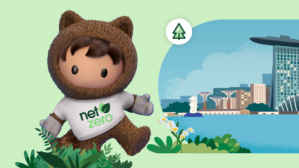The trail to net zero is a shared journey explains Boon Poh Mok, Director of Government Affairs & Public Policy, Southeast Asia & Greater China, Salesforce. When the public sector, private businesses, and people come together, they can accelerate sustainable outcomes for business and the planet.
Businesses in Asia Pacific are increasingly committing to net zero. By the end of 2021, 86% of companies across the region were already setting net zero targets or intended to do so over the next 12 months.
ASEAN countries in particular are forging ahead on the path to net zero. In March 2021, the Singapore government announced The Singapore Green Plan to advance the nation’s agenda on sustainable development. Committed action is also being taken by other countries in the region — Malaysia is implementing the Green Technology Master Plan 2017-2030 to create a low-carbon and resource efficient economy. Vietnam’s government has issued the country’s National Climate Change Strategy to 2050 to implement its COP26 commitments.
In 2022, Salesforce commissioned Access Partnership to prepare the Trail to Net Zero for Singapore report to investigate the sustainability efforts in the nation. The report also provides recommendations to accelerate the path to net zero. While it examines Singapore’s net zero journey, its recommendations are also useful to policymakers and business decision-makers across the ASEAN region. Here are some of the key findings and recommendations:
Sustainability requires a public-private-people approach
Climate change is a global challenge. Being a low-lying city-state, Singapore is particularly vulnerable to extreme weather events and rising temperatures. The Singapore Green Plan charts ambitious targets over the next 10 years to enable the nation to achieve its net zero aspirations with committed actions.
Singapore’s climate initiatives focus on lowering emissions through efficient power generation and energy demand, and boosting green spaces. A successful trail to net zero for Singapore will need the public sector, private sector, and people to work together. The public sector has taken the lead by setting the climate policy for achieving net zero. It is also partnering with the private sector in developing and implementing cutting-edge climate technologies. It provides incentives and grants to promote startups and ecopreneurs who build innovative solutions that merge business with positive social impact. It is equally important for the people to take advantage of opportunities to upskill themselves on sustainability initiatives. This can help them appreciate the importance of committed climate action and align their decision making with larger sustainability goals.
The business opportunity in net zero
YouGov surveys commissioned by Salesforce found that Singapore businesses strongly support action on climate change. The government’s net zero commitments resonated well in the business community — with 81% of managers supporting Singapore setting net zero emissions target by 2050. When asked whether enough is being done to address climate change, 54% of managers believed the government should be doing more, while 66% believed businesses should do more.
Businesses also had a sound understanding of the potential for growth opportunities in the transition to net zero. Singapore managers were three times more likely to think that achieving a net zero economy by 2050 will result in more jobs than less jobs (39% compared to 13%). The Singapore Green Plan 2030 projects a green economy will create 55,000 new jobs in Singapore over the next 10 years, with at least 4,000 created to date.
Businesses are also more conscious of emissions across their value chain. Almost two-thirds (61%) of Singaporean managers are more likely to purchase products or services from a supplier business with a net zero target.
Technology has an important role to play
On the trail to net zero, it is critical to adopt technologies that help reduce emissions and increase energy efficiency. Technology can open up opportunities for business innovation and growth, while helping to switch to more sustainable solutions. Artificial intelligence (AI) offers many use cases to achieve sustainability outcomes. It is already being used in Singapore to monitor pollution levels and mitigate extreme rainfall events. Other potential uses include smarter decision making for decarbonisation and efficient allocation of renewable energy.
Adoption of cloud computing can also enable businesses to lower their environmental impact, while offering greater flexibility, cost efficiency, speed, and business continuity. A study by S&P Global Market Intelligence has shown significant energy savings of 79% from moving business applications and IT workloads to the cloud.
Trail to Net Zero for Singapore reveals that a reduction of one million metric tons of carbon dioxide emissions can be achieved in 2022 by migrating to the cloud. Emissions reductions can be further boosted if cloud operators begin sourcing 100% renewable energy for their operations.
Walking the talk on net zero
While many businesses today talk about sustainability, it is critical to take actions and track progress to build credibility with customers and stakeholders. One of the ways to do this is to have a third party audit of your sustainability initiatives and provide recommended actions to achieve net zero.
Public and private organisations can also adopt a shared digital platform to forecast and track emissions. This can provide a single source of truth to ensure better decision making across an organisation’s operations, including its supply chain.
Sustainability is one of Salesforce’s core values, and we continually put it into action. For over a decade now, Salesforce has been on a sustainability transformation journey. We are a net zero company, and have achieved net zero emissions across our value chain, and are sourcing 100% renewable energy for our operations. We have funded more than 40 million trees as part of our 100 million trees goal. Our commitment to sustainability transformation has helped inform our Climate Action Plan and forms the basis of the Net Zero Cloud platform to help businesses go carbon neutral faster.
Sustainability is a shared journey. We walk the talk and walk together with businesses on their trail to net zero.
Learn more about Singapore’s sustainability mission in Trail to Net Zero for Singapore
Go carbon-neutral faster with Net Zero Cloud.
Team Earth has landed
Businesses that live their values by fixing what’s broken are doing good for the world in general. Things like equal access, opportunities, and rights for all. We call this being part of Team Earth.
























